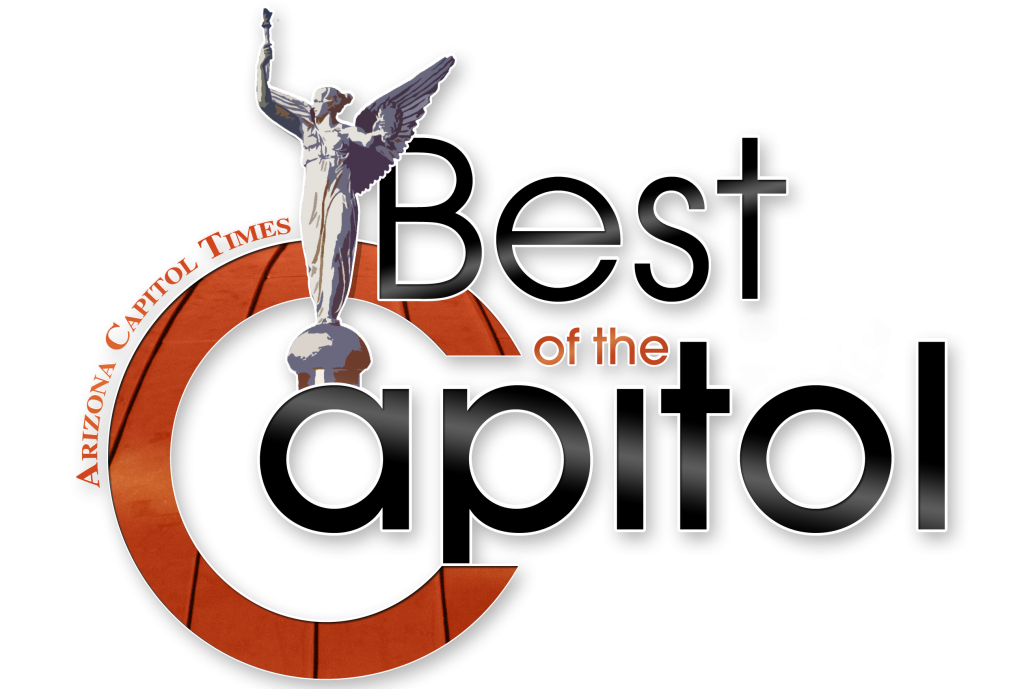GOP lawmaker starts ‘food fight’ with blind vendors
Bill Coates//July 3, 2009//[read_meter]
As a freshman lawmaker in 2007, Rep. Sam Crump’s first order of business was to find a good place to eat at the Capitol. He had hoped for something along the line of a Paradise Bakery, a favorite of his.
The Anthem Republican instead found cafeteria service run by legally blind operators under the state’s Business Enterprise Program (BEP).
“I was unimpressed, having been to three or four of the cafeterias at the Capitol,” he said.
But Crump now to wants to bring privately owned food franchises to the Capitol, saying he might introduce legislation next session to make it happen.
“I’m going to try to work on this during the interim to see if we can’t craft a proposal,” Crump said. His proposal would replace a program that has a 35-year track record in Arizona.
Blind operators, on the other hand, are fighting to keep the program.
“We’re definitely on top of this,” said Tim Mead, chairman of a group that represents Arizona blind operators. “This is our livelihood. That not only impacts us, but our employees.”
Each blind operator runs a food service as a business. Some of the larger cafeterias at the Capitol – including the Executive Tower café and a Department of Economic Security cafeteria – employ as many as a dozen workers. They run the services under a state law known as the mini-Randolph-Sheppard Act, fashioned after a federal law that dates back to the 1930s.
The state law gives blind operators right of first refusal to run food and vending services in state, county and city buildings. U.S. law applies to federal buildings. Every state except Wyoming has its own Randolph-Sheppard law.
In a March 27 opinion, Arizona Attorney General Terry Goddard said state-run prisons had to give BEP operators first shot at vending concessions in visitors’ areas.
DES administers BEP, which uses no state funds. Operators help pay their own way, turning over 20 percent of their earnings to DES in what’s known as a set-aside. That comes to about $400,000 a year. The set-aside, in turn, is used to bring in some $2 million in federal matching funds – for new equipment, administrative costs and other expenses.
Operators pay no rent for space in government buildings.
Crump, though, said privately run franchises – relying on market forces – would provide better food and generate more revenue. Some of that money could help the BEP operators, if those market forces put them out of business. A percentage of restaurant proceeds could go toward jobs programs for the disabled, including the blind, Crump said.
Mead said BEP already is a jobs program, for the blind operators and their employees – a program that’s much needed.
“At this point, there’s about 70-percent unemployment in the blind community,” Mead said. “We employ employees, just like any other small- business owner would do.”
Val Martin operates the state’s largest BEP cafeteria – the Val’s Getaway Café in the main DES building at 1789 W. Jefferson St. She said BEP operators employ about 400 people across the state.
As for the operators themselves, she said, “We work hard. I’m here at five in the morning and I leave at 3:30 (p.m.).”
But Crump said the program is not self-sustaining, relying on the federal subsidy for its existence. Private food vendors, he said, could operate without the handout and would draw more business.
He cited the food courts at Sky Harbor International Airport, saying similar setups would do a better job of serving the Executive Tower than the current diner, the Capitol Café.
“When you go to the airport, you see Cold Stone Creamery, Starbucks,” he said. “That cafeteria would not be able to compete,” he said.
Crump first sought information on BEP at an April 21 hearing of the House Committee on Government, which he chairs. Pat Harrington, assistant director for DES Employment and Rehabilitation Services, told the committee that Randolph-Sheppard operators in other states have entered into agreements with private food vendors.
“It is something DES would like to pursue to a greater extent,” Harrington told the committee.
In an e-mail, DES spokeswoman Kevan Kaighn said policy barred Harrington from commenting beyond his committee testimony. Calls to the DES offices of Harrington and two other BEP administrators were not returned.
In an interview, Mead agreed Arizona’s blind operators were exploring ways to partner with food franchises. And private chains, he added, are interested in doing business with blind operators. He cited an April convention of blind merchants in Indianapolis – known as BLAST for Business Leadership and Superior Training. Blind merchants heard presentations from a number of food-chain representatives, including Quiznos, Dunkin’ Donuts, Baskin-Robbins and Starbucks.
“They would love to work with us and get involved in these larger locations,” Mead said.
One merchant who partnered with the private sector is Nicky Gacos, vice president of the National Association of Blind Merchants. He contracted with Dunkin’ Donuts to set up shop in his space at a large U.S. Post Office in Jersey City, N.J.
These private partnerships are just beginning to take off, driven by the taste of government workers, Gacos said.
Two federal buildings in Washington – the Securities and Exchange Commission and Housing and Urban Development – he added, now have Dunkin’ Donuts coffee shops contracted through blind merchants under Randolph-Sheppard.
“Both wanted a Dunkin’ Donuts, and that’s what we able to bring them,” Gacos said.
There are eight Dunkin’ Donut coffee shops under Randolph-Sheppard in the United States, but Gacos said he expects more such partnerships to come on board. And not just with Dunkin’ Donuts. Other franchise partnerships in the works include Einstein Bagels, Cinnabun, Baja Fresh and Baskin-Robbins.
“The newest and the best one is probably Nathan’s,” Gacos said, referring to Nathan’s World Famous Hot Dogs.
Martin, operator of the BEP cafeteria at DES, has been exploring a partnership with a chain food service, but said a franchise might drive up prices. She did her own informal survey. Customers would rather keep the same service than pay more, she said.
With the poor economy, customers are more reluctant to spend, she said. Some state workers – including regular customers – have begun brown-bagging it, she added.
Martin also questioned Crump’s criticism of the food, at least as its served in her diner.
“This is home-style,” she said. “Our aim is to have good food.”
In addition, she and other BEP operators do not believe privately run franchises would generate the kind of revenue Crump foresees.
Among other things, Martin said, “they’re going to have to reimburse the state for all the equipment that is here.”
But concern about BEP is not just a Republican chairman’s issue.
Democratic Rep. Tom Chabin of Flagstaff said he’d like a see a program that benefits others with disabilities – not just the blind.
“I think that the exclusivity is too far-reaching,” said Chabin, who sits on the House Government Committee. “I’m with Representative Crump in examining the existing law.”
If the program is tailored to a narrow group of people, he said, “then it’s a problem for me.”
BEP operators are free to hire others who are disabled, but not blind, said Bob Kresmer, state president of the National Federation of the Blind in Arizona.
“There’s nothing preventing them from doing that,” he said. “And as a matter of fact, a number of Business Enterprise Program operators do hire people with other disabilities.”

















